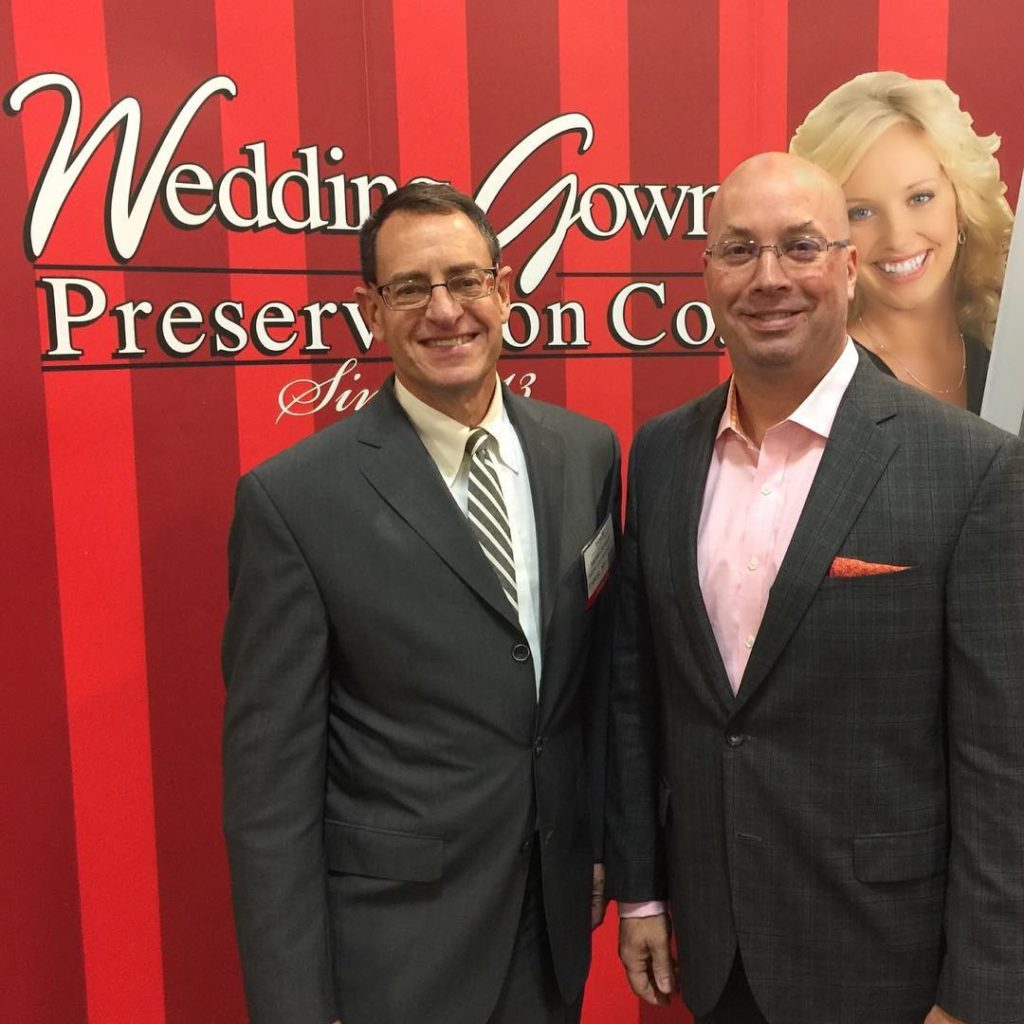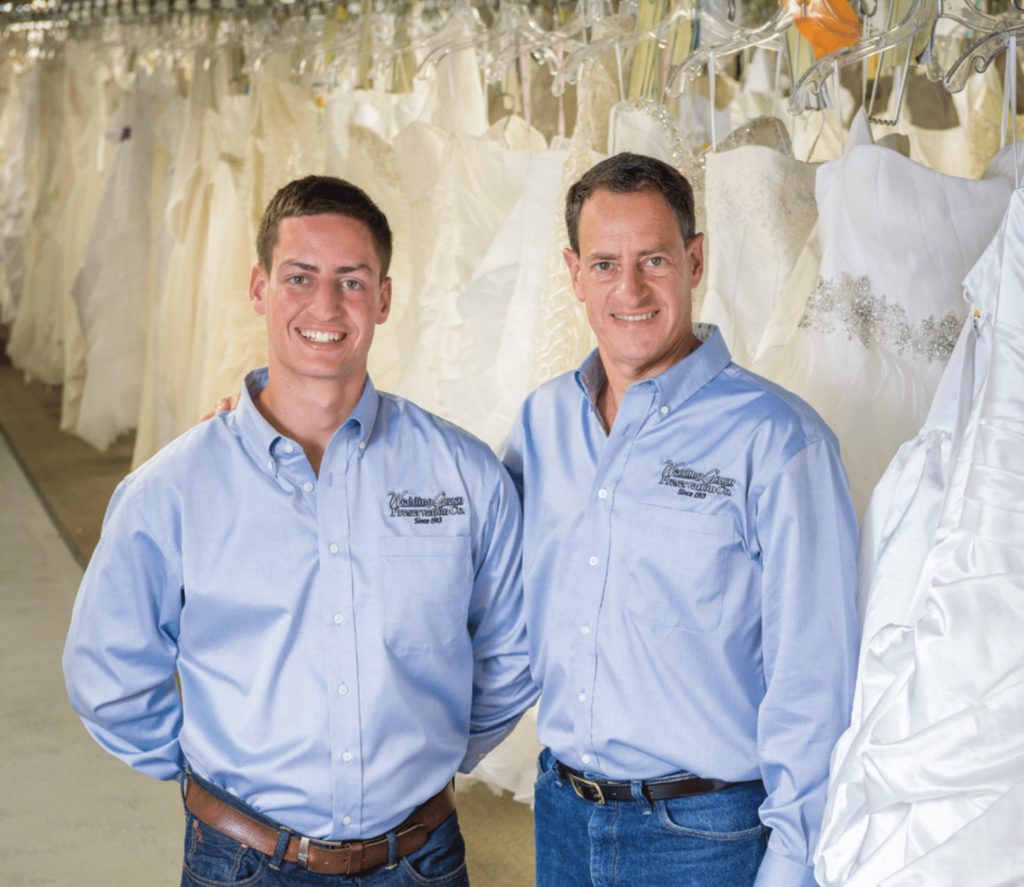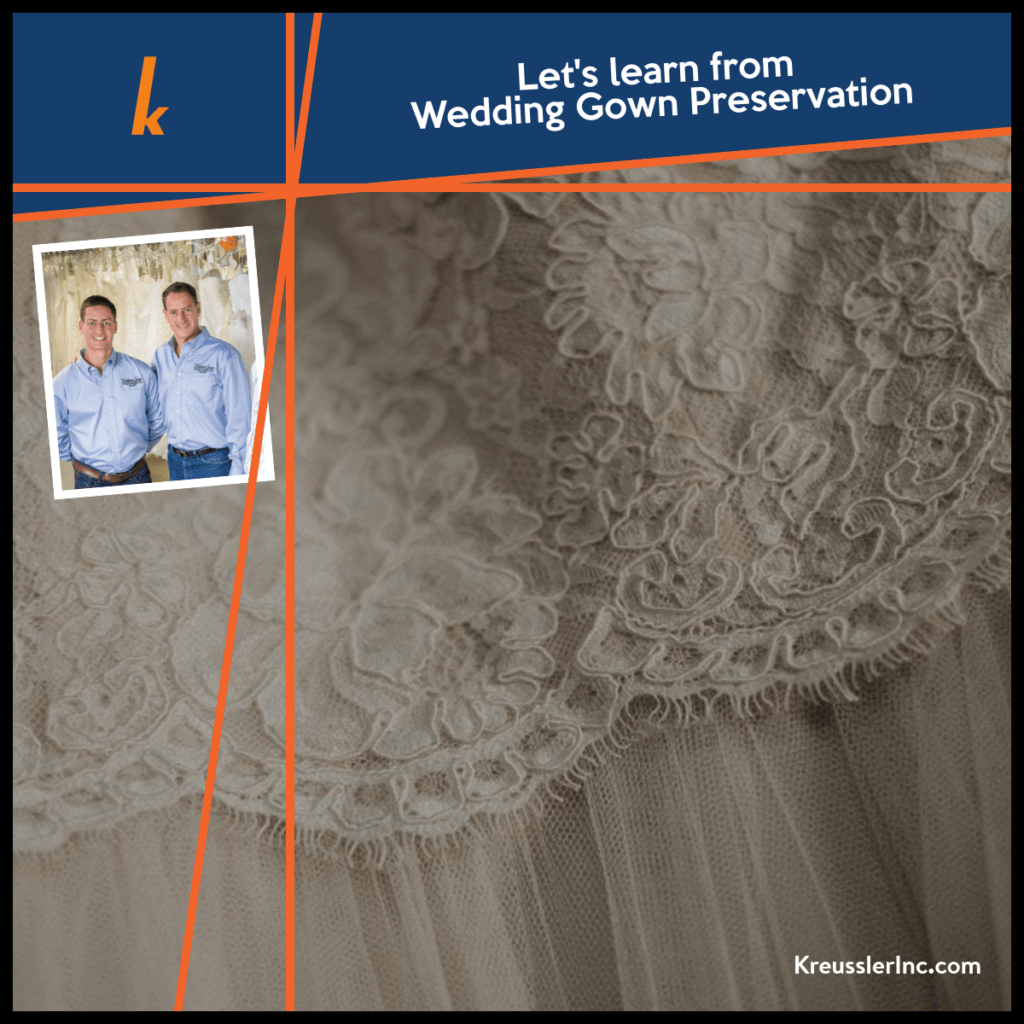For this month’s client spotlight, Richard Fitzpatrick, Vice President of Kreussler Inc., interviewed Michael Schapiro of Wedding Gown Preservation Company.
Wedding Gown Preservation Company was founded in 1913 by Sara and Joseph Schapiro in Endicott, New York. Sara and Joseph specialized in the preservation and alteration of wedding gowns. Together, they created the family formula which is still in use today. Wedding Gown Preservation Company now a third generation family-owned business operated by the Schapiro family. We hope you enjoy learning from a true expert in the field, we certainly did!
Richard: Mike, I’d like to thank you for taking the time to talk with us today. Why don’t you start by giving us a little bit of background about Wedding Gown Preservation. How did that start? What was the genesis for it?
Michael: Thank you for having me here, Wedding Gown Preservation Company started in 1913 by my grandmother and has been passed down through the family. Today it is run by my wife, Sue and myself.
Richard: Your family is pretty well known in the industry. You’ve had quite a broad career. Your brother Jeff owns Cleaner Supply, you had a large industrial laundry, and had a very successful tuxedo rental company. Why did you settle on the wedding gown business?
Michael: We felt it was a lifestyle change, the wholesale wedding gown business that we’re in is Monday through Friday 8 to 5 business, and it was really just that quality of life. We enjoy the people in the industry, so that’s really why we settled on this business.

Richard: Is it a little less overwhelming to run than some of the other companies?
Michael: Not really. We loved the industry uniform business. We loved CRDN, the tuxedo, and the retail dry cleaning business. They were all great in their time and still are, but this was a perfect business for our personalities.
Richard: Can you describe a little bit about how your company functions, the business model. You’re a wholesale provider, you don’t have locations where people can come and bring things to you, right? It’s strictly mail order.
Michael: Correct. Dry cleaners and bridal shops send us their wedding gowns. Currently about 68% of our work comes from dry cleaners, the balance comes from tuxedo shops, alteration stores, and bridal shops.
Richard: And it’s done through a pre-purchase kit that is then passed on to the bride? Or is there another method for collecting gowns and sending them into you?
Michael: The prepaid kits are sold through bridal shops. Many dry cleaners purchase a prepaid coupon book of preservations that offers them a discount off 10 or more preservations. But most dry cleaners pay for each dress as it is set to us.
Richard: Is it a one price deal or do you have up charges, depending on the complexity of the pieces that you’re cleaning?
Michael: The price is a one price fits all gowns. We do not charge extra if it’s a silk or it’s heavily embellished and that price includes three additional pieces. We try and keep the pricing simple for our dealers.
Richard: Full disclosure you use quite a bit of Kreussler products in the production facility. I know a lot of times, there’s economy to scale as you grow, but what I’ve seen in your plant, is that it’s still a very labor-intensive process. Is that your feeling as well, in the cleaning of the gowns, the spotting, and the cleaning?
Michael: Absolutely. The best way to clean a hem is to manually scrub it. There’s only one way to do it which is manually. We really aren’t able to batch the gowns for all cleaning, not with the high value of the gowns. We really work on gowns individually.
Richard: So, although you’re a wholesale provider, it’s very much of a boutique process, in terms of the quality of the cleaning and the way the gowns move through the facility.
Michael: Yes. It’s really very manual, very. Thank God our staff has no turnover and that helps us with the staff knowing the manufacturers, and what they need to do with each brand of gown.
Richard: You have people that have been with you for quite some years. Isn’t that right?
Michael: Yes. We have quite a few that are celebrating 30 years, 35 years and more.
Richard: In this industry that’s really amazing.
Michael: Yep. Thank you.
Richard: You have been cleaning gowns for so long, you obviously have seen a lot of changes and trends. In the last 10, 15 years, what have been some of the more noticeable changes in this segment?
Michael: There is a large manufacturer and retailer of wedding gowns, David’s Bridal. David’s has given bridal shops a lot of competition. David’s Gowns mostly are a polyester gown, and a less expensive. So those are really the biggest changes facing this industry. Not a lot has really changed in the way we process gowns since I was young.
Richard: In the retail cleaning business, which you did operate for a number of years, and mostly over the last 10, 12 years, we’ve seen this boom in fast fashion, where we’ve seen really low-quality pieces coming on to the marketplace, some of them make their way into dry cleaning shops, and they just don’t service very well. Is that similar to what you’re seeing with some of these lower priced pieces that are coming in? That they’re not really made to be serviced well.
Michael: Our customer is generally the better dry cleaner, and really we do not see a lot of the inexpensive gowns. The are several manufacturers from China that are selling direct via the internet these are mostly very low-cost gowns. That generally is not our focus customer. We’re actually trying to service upscale drycleaners and bridal shops. Being recommended by high-end gown manufacturers and designers has helped raise our profile.

Richard: Okay. In the production aspect of things, you have a pretty robust wet cleaning department, but then you also have a dry cleaning machine running SOLVONK4. How do you see the mix of work breaking down between those two technologies, what goes wet, what goes dry?
Michael: So, generally almost 1/3 of the gowns are going through SOLVONK4, 1/3 of the dresses are wet cleaned, and 1/3 of the gowns are hand cleaned.
Richard: Really, hand cleaned?
Michael: Yep.
Richard: I think that’s a significant aspect that you guys are willing and actually processing gowns strictly by hand, which is something that a lot of shops don’t want to do. I mean it’s just so labor intensive.
Michael: Yes, our goal is to process wedding gowns using the safest method.
Richard: Approximately how many gowns you guys are processing a day right now?
Michael: We are processing about 1,000 wedding gowns a week, on average.
Richard: I’ll preface this by saying that dry cleaners are trying to capture revenue, they’re trying to keep as much as they can in-house. I’ve had conversations with people that are in the wholesale leather cleaning industry that blame chemical companies like Kreussler for trying to convince dry cleaners to clean leather and suede in-house. That’s not really what we do, but in terms of cleaning gowns, I have a lot of clients who do clean their own gowns, and they’re really happy doing it and they have space and skill set.
Michael: And they’re good at it. Yeah.
Richard: When you’re approaching a prospective client, what do you say to them to get them to come over to your side of things?
Michael: The number one driver for dry cleaners to use our service is when they’ve ruined a gown.
Michael: When a dry cleaner has paid a large claim, that’s a huge driver for them to now sub-contract out cleaning and preservation of wedding gowns. The other big factor would be the dry cleaner who just does not have the room or the time to do wedding gowns. And it keeps falling back on the owner to do the wedding gown. A lot of those owners now want to make sure they focus on what they do best and where they can use their time best. Since we take all responsibility on the gown, that is a very comforting thing for the dry cleaner to know, that they don’t have to get caught in the middle of any situation.
Richard: That makes perfect sense. Briefly, and this is just an observation, you and I both spend quite a bit of time on the road, networking and meeting with clients and things like that. I’m kind of curious to your opinion about selling in the marketplace and the use of one-on-one contact versus other marketing tools. For you, growing your company, where do you feel the most benefit comes and how do you reach your sales goals?
Michael: We get some customers by referrals. We get some customers by seeing an ad that we’ve placed. We’ll get some customers by a mailing we’ve done. Some respond to a phone call we make to them. And some customers come in from trade shows. There’s still that group of customer who wants to see you explain the program, and will only sign up once you’ve met them in their store and met with their staff. So yes, we still believe very strongly on having feet on the street. We cover the U.S. with salespeople that can build the relationship with retailers.
Richard: And your company offers support material for the cleaner to be able to sell the service I would imagine?
Michael: Yes. So one of the few things my grandmother always stressed was that all advertising material and support materials be given to our dealers at no charge. To this day all advertising, postcards, posters, displays, all that is given to a dealer at no cost.
Richard: Are your clients able to come and visit your facility, if they wanted to?
Michael: Yes, not only our clients can come to our facility, our facility, which we feel is state-of-the-art, is open to anyone who would like to tour it.
Richard: That is a great opportunity, I can say I have never been in a production facility like it, really amazing.
Michael: Thank you.
Richard: You’re well aware that there’s this trend to move from owning things to renting things. So there’s a couple of different companies that are growing and thriving in the rental of garments. Do you think that may pose a risk to this segment? Do you think there’s a potential for that to take a little bit of the market?
Michael: We have not seen any successful operation yet rent wedding gowns, although many have tried. The wedding gown is still one of those items that are very personal to a bride.
Richard: And you think that’ll help keep the security of the market?
Michael: We hope.
Richard: Michael Schapiro, I’d like to thank you very much for taking the time to talk to us. If people want to take you up on your offer to tour your facility, I couldn’t recommend it enough. It’s a fantastic place and a great company. So, thanks for talking to us.
Michael: Thank you, Rich.
You can learn more about Wedding Gown Preservation Company here and contact them directly through their website.

